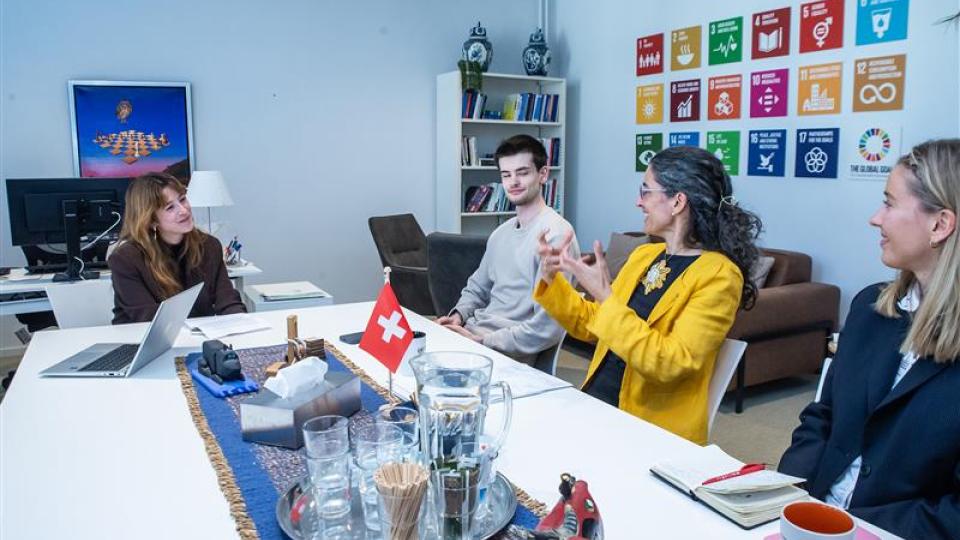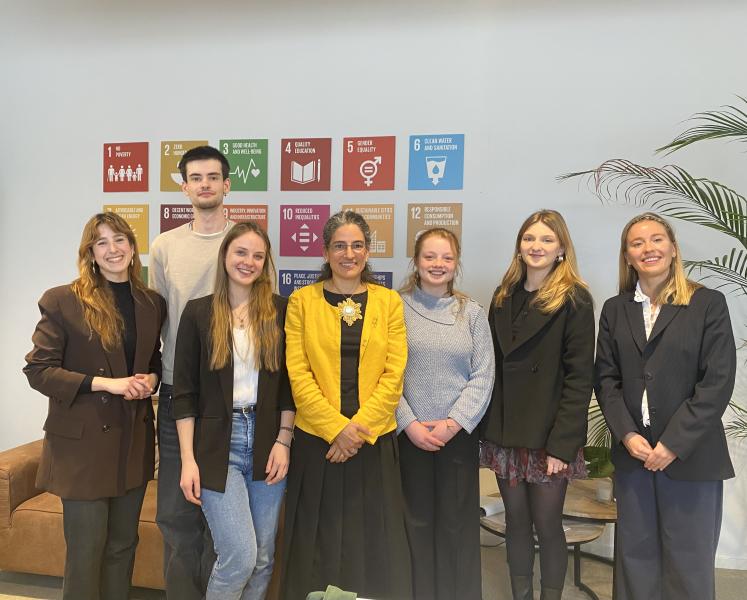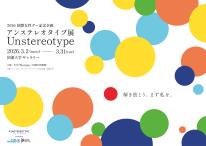During her recent visit to UNU-MERIT, Her Excellency Corinne Cicéron Bühler, Ambassador of Switzerland to the Netherlands, sat down for a candid conversation with student ambassador Margarida Leite Magalhães. Their discussion covered everything from the twists of career paths to the human side of diplomacy, offering inspiration to aspiring international professionals in our student community.
An Unplanned Path to Diplomacy
Ambassador Cicéron Bühler’s journey into diplomacy was anything but linear. Originally trained in law, she quickly realised the courtroom was not for her. “I didn’t want to defend people in court, but I still wanted to apply the law,” she explained. Her curiosity led her to the College of Europe in Bruges and then to an internship at Switzerland’s Directorate for International Law.
Though her start in the Ministry of Foreign Affairs was as a legal advisor—not a diplomat—she soon saw an opportunity to broaden her impact. “I loved international law, but I couldn't see myself doing just that for the rest of my life,” she said. “Diplomacy gave me a way to combine legal work with international relations and a political context.”
She candidly shared that she had a “plan B” in case she did not pass Switzerland’s notoriously competitive diplomatic concours: a master’s in transnational economic crime. Fortunately, she passed and launched a diplomatic career that took her from post-conflict Bosnia to Israel, and later to a senior legal position at the Swiss MFA. That role prepared her well for her current post in The Hague, where she now wears two hats: representing Switzerland bilaterally to the Netherlands and multilaterally to the international organisations based there.

No Such Thing as a Typical Day
When asked what a day in the life of an ambassador looks like, the Ambassador smiled: “There’s no such thing as a typical day.”
Her schedule shifts depending on global events. Some days, she meets with top officials at the International Criminal Court. Other times, she facilitates bilateral visits or signs cooperation agreements - such as a recent one on science and education between Switzerland and the Netherland. “It’s a mix of diplomacy, policy, and creating concrete results,” she explained.
Her story about a young woman who pursued a PhD after hearing her speak on the crime of aggression underscored a powerful message: when diplomats speak with passion, they can inspire the next generation of changemakers.
Switzerland’s Priorities on the World Stage
Touching on Switzerland’s international agenda, Ambassador Cicéron Bühler highlighted three major priorities: strengthening relations with the EU, promoting multilateralism, and advancing peace and security. She noted Switzerland’s recent term on the UN Security Council as a major milestone, showing the country’s commitment not just to following international rules, but shaping them.
“Neutrality does not mean passivity,” she stressed. Switzerland may not send military support, but it actively contributes to peace through diplomacy, humanitarian aid, and post-conflict recovery. Recent Swiss conferences on Ukraine exemplify this bridge-building approach."
Words of Advice for Aspiring Diplomats
For students considering careers in diplomacy, the Ambassador had several key takeaways: Stay open-minded. Be ready to pivot. And don't be discouraged by rejection. “Some people decide they want to be diplomats at six years old—but then they fail the exam because they’re too narrowly focused,” she said.
She encouraged students to embrace diverse experiences, even those that seem unrelated at first glance. “If I had stayed in one office my entire career, I would not have ended up where I am. It’s the mix—Bosnia, Brussels, Tel Aviv—that made me a stronger candidate.”
Passion and flexibility, she noted, are more valuable than a rigid five-year plan. “You don’t control the timeline—sometimes your dream job opens earlier than expected, and you have to be ready to leap.”
The Future of Diplomacy: Values, Agility, and Human Connection
Looking to the future, the Ambassador reflected on how diplomacy is evolving in an age of digitalisation and global uncertainty. While AI may streamline legal analysis, she believes it can never replace human intuition and emotional intelligence.
“Diplomacy relies on relationships. In negotiations, it is often the informal chats over coffee that lead to breakthroughs,” she said. The skills that matter most in the next generation of diplomats? “Critical thinking, adaptability, and above all, passion. Robots may process information, but they cannot inspire.”
She concluded with advice that resonated deeply with the students present: “Be yourself. Employers are looking for genuine people they can imagine on their team—not a cookie-cutter CV.”
Making It Count
As the interview wrapped up, the Ambassador shared one final reflection: “I would choose this path again—even with the obstacles. If you wake up in the morning and your work makes sense to you, that is what counts. If it does not, why get up at all?”
Suggested citation: Margarida Leite Magalhães. "From Law School to Diplomacy: A Conversation with the Swiss Ambassador to the Netherlands ," United Nations University, UNU-MERIT, 2025-03-27, https://unu.edu/merit/article/law-school-diplomacy-conversation-swiss-ambassador-netherlands.



